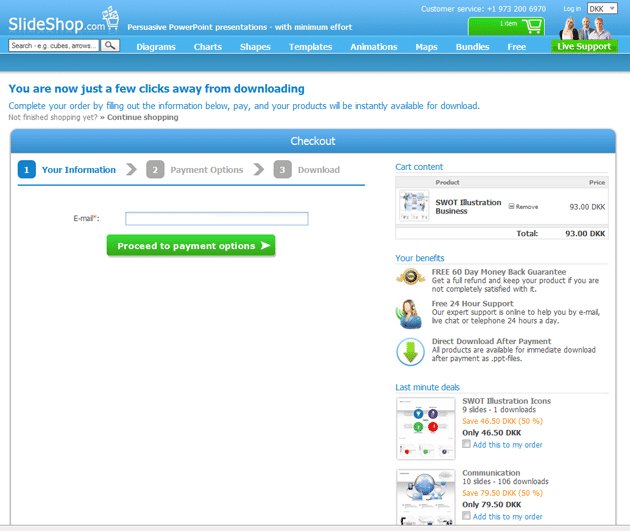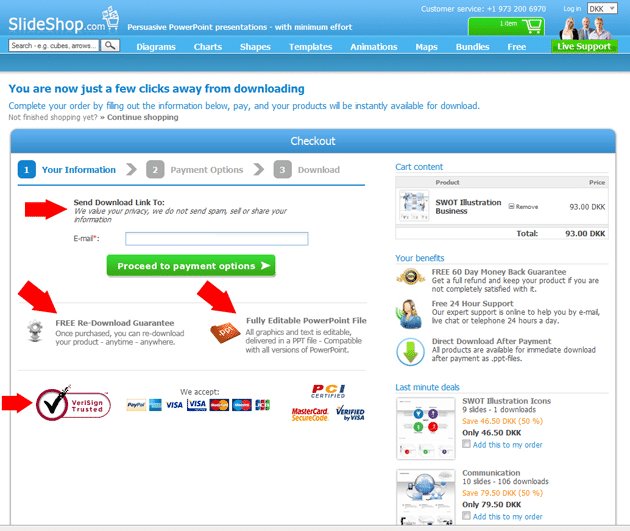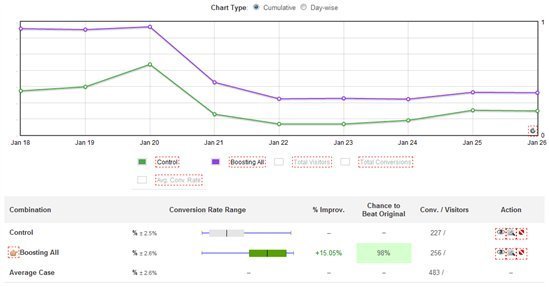Optimeria Optimized The SlideShop Site, Leading To Higher Purchases
About Optimeria
Karsten Lund is the CEO of Optimeria, a Danish company, which is a VWO-certified partner. He wrote about this success story wherein he managed to increase sales by 15% by optimizing the checkout page.
SlideShop offers great powerpoint templates at a cheap price.
Goals
The checkout on SlideShop itself is a simplistic version of a normal checkout process, because they sell a digitally downloadable product (PowerPoint presentations + elements). There are 3 simple steps in the overall process:
- Enter the email address.
- Choose the payment option.
- Pay and download the product.
They identified 3 main problems with the current Enter the email address page (step 1 in checkout) and decided to address it, hoping to decrease shopping cart abandonment.
Tests run
The test was a radical split URL test where they bundled multiple elements into a single treatment and put it to test against the control (the original checkout page). Prior to constructing the variation page, they made use of an extensive range of conversion flow analysis and also used findings in other tests from the same client.

Original checkout page

Variation: 15% Increase in Sales
Conclusion
The results were +15.05% conversion rate increase with a 98% statistical validity and 200+ conversions per treatment.

How the Concerns Were Addressed
Concern #1: Why are you asking for my email address?
As you surf over the Internet as a shopper, a lot of decisions are made from intuition. Your brain only asks you from time-to-time to justify a choice your subconscious had already made for you. So in many ways, you are actually shopping on autopilot.
This autopilot does not like when things aren’t as expected. This is especially true for the checkout step, because it is so close to making an actual payment. Therefore, they needed to address the concern (on the SlideShop checkout page) of asking for an email address without any explicit motivation.
They addressed this issue by adding a value to the transaction (Send download to this email address) and stressed that email information would not be misused, sold, or shared. They fulfilled the value to the customer in this exchange.
Concern #2: When I get through all this, what can I expect from your product / services?
There are always unique concerns that only apply to one business, product, or service and in this case, they already knew that one of the concerns of the customer was “How can I actually use your product after I’ve downloaded it.”
They addressed both issues at the very center and prominent position, just beneath the call to action, to signal to the user that they know these concerns were there and that customers shouldn’t be worried about them.
Concern #3: OK, I will do the payment, but what if my credit card info is stolen?
When a call to action is as crucial as “continue to payment options,” it’s also going to set in motion some common insecurities about the next transaction. Even if we all know that we aren’t going to be charged anything before filling credit card details, we don’t like the feeling of being in a situation where security issues aren’t addressed before moving on to the actual payment step.
This concern was addressed by adding the following to the variation:
- What kind of different credit cards are accepted
- Trust seal by Verisign to ensure transaction will be safe
- Known security items of the actual payment transaction (like PCI compliance, Verified by Visa, etc.)
Key Learning
Some of these elements were unique for SlideShop and the market in which they operate, the learning from this success story is that it is crucial to address key concerns (conscious and subconscious ones) at the right stage in a decision process.

Location
Denmark
Industry
Agency
Impact
15.05% increase in Purchases













